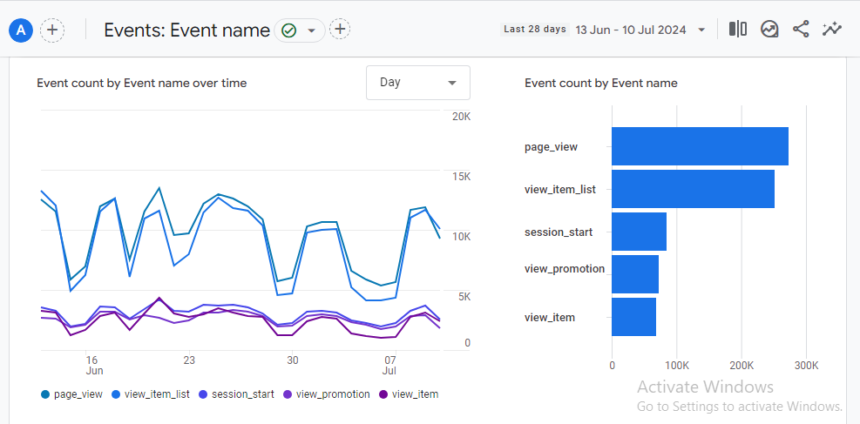Google Analytics 4 (GA4) is a powerful tool that provides valuable insights into user behavior, website performance, and marketing effectiveness. Understanding which metrics to track can help you optimize your strategies, enhance the userthe userthe user experience, and improve conversions. In this guide, we will explore essential GA4 metrics that every website owner, marketer, or business should monitor.
1. User Engagement and Session Metrics
User engagement is a key indicator of how visitors interact with your site. GA4 provides detailed engagement metrics to help you measure audience interest and retention.
Engaged Sessions: This metric shows the number of sessions where users interacted with the site for at least 10 seconds, triggered a conversion, or had two or more page views.
Engagement Rate: Unlike bounce rate in Universal Analytics, engagement rate focuses on how actively users participate in a session. A higher engagement rate means your content is relevant and appealing.
Average Engagement Time: This represents the average time users spend on your website during an active session. The longer the duration, the more engaged your visitors are.
Monitoring these metrics can help you identify which content performs best and where improvements are needed.
2. Traffic Acquisition Sources
Understanding where your visitors come from is crucial for optimizing marketing campaigns. GA4 categorizes traffic sources to help you analyze performance.
Organic Search: Traffic from search engines like Google and Bing. Strong organic traffic indicates effective SEO strategies.
Paid Search: Visitors who land on your site via Google Ads or other PPC campaigns. Monitoring paid traffic helps refine ad targeting and budgeting.
Direct Traffic: Users who visit your site by typing your URL directly. This often includes returning visitors or those who have bookmarked your page.
Referral Traffic: Visits from external sites linking to your content. High referral traffic means successful link-building strategies and partnerships.
Social Media: Traffic from platforms like Facebook, Twitter, and Instagram. This helps gauge the effectiveness of social media marketing efforts.
Analyzing traffic sources allows you to adjust marketing strategies and invest more in high-performing channels.
3. Conversion Tracking and Events
GA4 uses event-based tracking, allowing you to monitor important user actions. Setting up event tracking helps measure website success and conversions.
Conversions: Custom-defined actions like form submissions, purchases, or sign-ups. GA4 enables event-based conversion tracking tailored to business goals.
Event Count: The total number of times an event occurs, such as video plays, clicks, or downloads.
Revenue Metrics: If you run an eCommerce store, GA4 tracks total revenue, average order value, and purchase completion rates.
Tracking conversions and events helps refine your website and marketing strategies to drive business growth.
4. Audience Demographics and Interests
GA4 provides insights into user demographics, including age, gender, location, and interests. This data is invaluable for creating targeted marketing campaigns.
Age and Gender Breakdown: Helps tailor content and advertising to specific demographics.
Geographic Data: Identifies where most of your visitors come from, allowing for localized marketing efforts.
User Interests: GA4 categorizes users based on their online behavior, helping you align content with audience preferences.
Leveraging audience data ensures personalized experiences that boost engagement and conversions.
5. Website Performance and Load Speed
Site performance directly affects user experience and search rankings. GA4 provides insights into page load times and site speed issues.
Page Load Speed: Faster-loading pages improve retention rates and lower bounce rates.
User Interaction Delays: Identifies any slow-loading elements that may cause frustration.
Mobile vs. Desktop Performance: Understanding how users interact with your site across devices helps optimize mobile experiences.
Optimizing site speed enhances user satisfaction and improves SEO rankings.
Conclusion
Google Analytics 4 is a powerful platform that provides critical insights into website performance, user behavior, and marketing success. By tracking key metrics such as engagement, traffic sources, conversions, audience demographics, and site performance, you can make data-driven decisions to improve your website’s effectiveness.
Regularly analyzing these metrics will help you optimize your content strategy, enhance user experience, and increase revenue opportunities through targeted marketing efforts. Start leveraging GA4 today to gain a competitive edge in the digital landscape.
